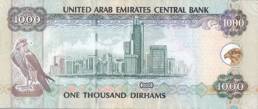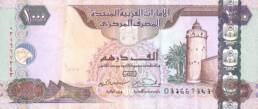MONEY AND CURRENCY
Abu Dhabi’s official currency is the United Arab Emirates dirham, often represented by the symbol AED or simply Dhs. The dirham is linked to the US dollar at a relatively stable exchange rate. This fixed parity provides predictability for visitors in terms of budget planning and currency conversion.
1. Exchange rates
Generally around 4.20 AED for 1 EURO. The exchange rate of the Dirham against the Euro changes regularly, as the rate is linked to the US dollar. 1 dollar is equivalent to AED 3.67, making the dirham a relatively stable currency. You can calculate the exchange rate yourself quite easily, on average you can divide Abu Dhabi prices by 4.5/5 to arrive at the Dutch price. On average, 1 euro is worth between 4.50 and 5 dirham, and 1 dirham is worth around 0.20 to 0.25 euro cents. 1 Dirham is made up of a hundred threads.
2. How do I exchange euros for Arab Emirates Dirham?
Exchanging euros into Arab Emirates Dirham (AED) in Dubai is a relatively simple process and can be done in several ways:
1. Exchange offices
You can exchange your euros for AED at exchange bureaus, which are conveniently located in airports, shopping malls, and popular tourist areas in Abu Dhabi. These bureaus often provide competitive exchange rates with minimal transaction fees, making them a popular choice for visitors.
2. Banks
Banks are a secure option for currency exchange and typically operate from Sunday to Thursday, from 8:00 am to 3:00 pm. While their exchange rates may not be as favorable as those at specialized bureaus, banks are a professional and reliable choice.
3. At the airport
Exchanging money at the airport is convenient but may result in less favorable rates compared to exchange bureaus in the city. It’s wise to exchange a small amount at the airport to cover immediate expenses, then look for better rates elsewhere.
4. Automatic teller machines (ATMs)
Withdrawing dirhams directly from an ATM using your debit or credit card is a convenient and often cost-effective method. ATMs in Abu Dhabi are widely available and operational 24/7. However, be mindful of international transaction fees or currency conversion charges applied by your bank.
5. International debit/credit cards
International debit and credit cards are widely accepted in Abu Dhabi for direct payments and cash withdrawals. Using your card can save you from carrying large amounts of cash, but check with your bank about any associated fees for international use.
Tips for exchanging money
- Compare rates: Check the exchange rates offered by various bureaus to get the best deal.
- Hidden charges: Always inquire about any additional fees before completing a transaction.
- Safety: Be cautious when carrying large amounts of cash and avoid displaying money in public places.
Tipping in Abu Dhabi
- Haggling: Bargaining is common in traditional markets like souks but is not practiced in malls or supermarkets where prices are fixed.
- Cabs: Rounding up cab fares is a courteous practice.
- Hotels: It’s common to tip housekeeping staff between AED 3 and AED 5 per day.
- Restaurants: A 10% tip is customary unless a service charge is already included in the bill.
With these tips, you’ll be well-prepared to handle currency exchange and tipping during your stay in Abu Dhabi, ensuring a smooth and enjoyable trip.
3. Emirati tickets
Eight types of banknotes make up Emirati currency: there are : 5, 10, 20, 50, 100, 200, 500 and 1000 dirhams. The front of all banknotes is numbered and written with English numerals, while the back remains written and numbered in Arabic with a different image of a building or monument representative of the United Arab Emirates. You’ll also notice that the Falcon, the national bird and official emblem of the United Arab Emirates, is omnipresent on the front of all banknotes.
5 Dirhams :
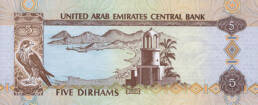
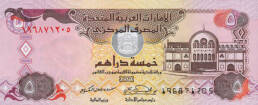
10 Dirhams :
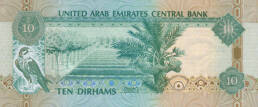
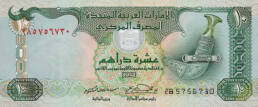
20 Dirhams :
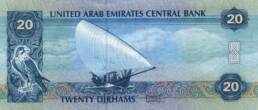
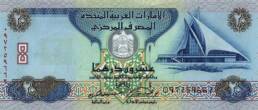
50 Dirhams :
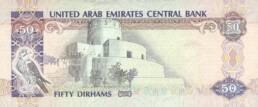
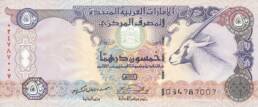
100 Dirhams :
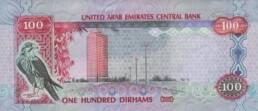
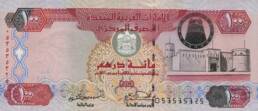
200 Dirhams :
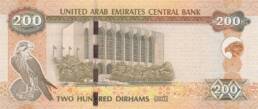
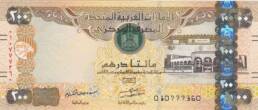
500 Dirhams :
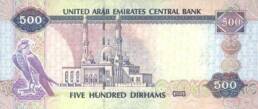
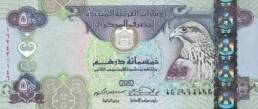
1000 Dirhams :
